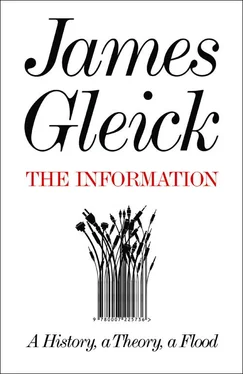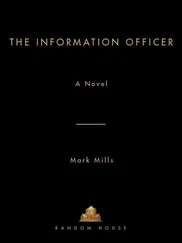Was McLuhan right, or was Hobbes? If we are ambivalent, the ambivalence began with Plato. He witnessed writing’s rising dominion; he asserted its force and feared its lifelessness. The writer-philosopher embodied a paradox. The same paradox was destined to reappear in different guises, each technology of information bringing its own powers and its own fears. It turns out that the “forgetfulness” Plato feared does not arise. It does not arise because Plato himself, with his mentor Socrates and his disciple Aristotle, designed a vocabulary of ideas, organized them into categories, set down rules of logic, and so fulfilled the promise of the technology of writing. All this made knowledge more durable stuff than before.
And the atom of knowledge was the word. Or was it? For some time to come, the word continued to elude its pursuers, whether it was a fleeting burst of sound or a fixed cluster of marks. “Most literate persons, when you say, ‘Think of a word,’ at least in some vague fashion think of something before their eyes,” Ong says, “where a real word can never be at all.” Where do we look for the words, then? In the dictionary, of course. Ong also said: “It is demoralizing to remind oneself that there is no dictionary in the mind, that lexicographical apparatus is a very late accretion to language.”
1 It is customary to transcribe a two-place sexagesimal cuneiform number with a comma—such as “7,30.” But the scribes did not use such punctuation, and in fact their notation left the place values undefined; that is, their numbers were what we would call “floating point.” A two-place number like 7,30 could be 450 (seven 60s + thirty 1s) or 7½ (seven 1s + thirty 1/60s).
2 Not that Miller agrees. On the contrary: “It is hard to overestimate the subtle reflexive effects of literacy upon the creative imagination, providing as it does a cumulative deposit of ideas, images, and idioms upon whose rich and appreciating funds every artist enjoys an unlimited right of withdrawal.”
3 The interviewer asked plaintively, “But aren’t there corresponding gains in insight, understanding and cultural diversity to compensate detribalized man?” McLuhan responded, “Your question reflects all the institutionalized biases of literate man.”
Chapter Three
Two Wordbooks
(The Uncertainty in Our Writing, the Inconstancy in Our Letters)
In such busie, and active times, there arise more new thoughts of men, which must be signifi’d, and varied by new expressions.
—Thomas Sprat (1667)
A VILLAGE SCHOOLMASTER AND PRIEST made a book in 1604 with a rambling title that began “A Table Alphabeticall, conteyning and teaching the true writing, and understanding of hard usuall English wordes,” and went on with more hints to its purpose, which was unusual and needed explanation:
With the interpretation thereof by plaine English words, gathered for the benefit & helpe of Ladies, Gentlewomen, or any other unskilfull persons.
Whereby they may the more easily and better understand many hard English wordes, which they shall heare or read in Scriptures, Sermons, or elsewhere, and also be made able to use the same aptly themselves.
The title page omitted the name of the author, Robert Cawdrey, but included a motto from Latin—“As good not read, as not to understand”—and situated the publisher with as much formality and exactness as could be expected in a time when the address , as a specification of place, did not yet exist:
At London, Printed by I. R. for Edmund Weaver, & are to be sold at his shop at the great North doore of Paules Church.

CAWDREY’S TITLE PAGE
Even in London’s densely packed streets, shops and homes were seldom to be found by number. The alphabet, however, had a definite order— the first and second letters providing its very name—and that order had been maintained since the early Phoenician times, through all the borrowing and evolution that followed.
Cawdrey lived in a time of information poverty. He would not have thought so, even had he possessed the concept. On the contrary, he would have considered himself to be in the midst of an information explosion, which he himself was trying to abet and organize. But four centuries later, his own life is shrouded in the obscurity of missing knowledge. His Table Alphabeticall appears as a milestone in the history of information, yet of its entire first edition, just one worn copy survived into the future. When and where he was born remain unknown—probably in the late 1530s; probably in the Midlands. Parish registers notwithstanding, people’s lives were almost wholly undocumented. No one has even a definitive spelling for Cawdrey’s name (Cowdrey, Cawdry). But then, no one agreed on the spelling of most names: they were spoken, seldom written.
In fact, few had any concept of “spelling”—the idea that each word, when written, should take a particular predetermined form of letters. The word cony (rabbit) appeared variously as conny, conye, conie, connie, coni, cuny, cunny , and cunnie in a single 1591 pamphlet. Others spelled it differently. And for that matter Cawdrey himself, on the title page of his book for “teaching the true writing,” wrote wordes in one sentence and words in the next. Language did not function as a storehouse of words, from which users could summon the correct items, preformed. On the contrary, words were fugitive, on the fly, expected to vanish again thereafter. When spoken, they were not available to be compared with, or measured against, other instantiations of themselves. Every time people dipped quill in ink to form a word on paper they made a fresh choice of whatever letters seemed to suit the task. But this was changing. The availability—the solidity—of the printed book inspired a sense that the written word should be a certain way, that one form was right and others wrong. First this sense was unconscious; then it began to rise toward general awareness. Printers themselves made it their business.
To spell (from an old Germanic word) first meant to speak or to utter. Then it meant to read, slowly, letter by letter. Then, by extension, just around Cawdrey’s time, it meant to write words letter by letter. The last was a somewhat poetic usage. “Spell Eva back and Ave shall you find,” wrote the Jesuit poet Robert Southwell (shortly before being hanged and quartered in 1595). When certain educators did begin to consider the idea of spelling, they would say “right writing”—or, to borrow from Greek, “ orthography .” Few bothered, but one who did was a school headmaster in London, Richard Mulcaster. He assembled a primer, titled “The first part [a second part was not to be] of the Elementarie which entreateth chefelie of the right writing of our English tung.” He published it in 1582 (“at London by Thomas Vautroullier dwelling in the blak-friers by Lud-gate”), including his own list of about eight thousand words and a plea for the idea of a dictionary:
It were a thing verie praiseworthie in my opinion, and no lesse profitable than praise worthie, if some one well learned and as laborious a man, wold gather all the words which we use in our English tung . . . into one dictionarie, and besides the right writing, which is incident to the Alphabete, wold open unto us therein, both their naturall force, and their proper use.
He recognized another motivating factor: the quickening pace of commerce and transportation made other languages a palpable presence, forcing an awareness of the English language as just one among many. “Forenners and strangers do wonder at us,” Mulcaster wrote, “both for the uncertaintie in our writing, and the inconstancie in our letters.” Language was no longer invisible like the air.
Читать дальше












